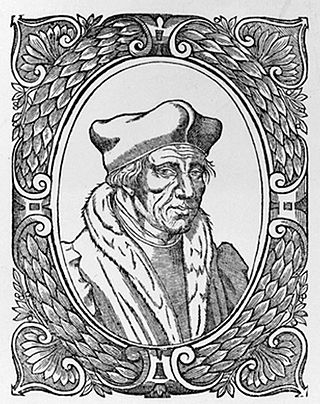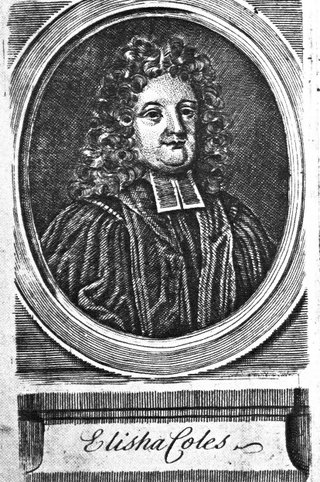
Desiderius Erasmus Roterodamus was a Dutch philosopher and Catholic theologian who is considered one of the greatest scholars of the northern Renaissance. As a Catholic priest, he was an important figure in classical scholarship who wrote in a pure Latin style. Among humanists he was given the sobriquet "Prince of the Humanists", and has been called "the crowning glory of the Christian humanists". Using humanist techniques for working on texts, he prepared important new Latin and Greek editions of the New Testament, which raised questions that would be influential in the Protestant Reformation and Catholic Counter-Reformation. He also wrote On Free Will,In Praise of Folly, Handbook of a Christian Knight, On Civility in Children, Copia: Foundations of the Abundant Style and many other works.
Nicholas Udall was an English playwright, cleric, schoolmaster, the author of Ralph Roister Doister, generally regarded as the first comedy written in the English language.
Middle English Bible translations (1066-1500) covers the age of Middle English, beginning with the Norman conquest and ending about 1500. Aside from Wycliffe's Bible, this was not a fertile time for Bible translation. English literature was limited because French was the preferred language of the elite, and Latin was the preferred literary language in Medieval Western Europe.
Erasmus (1466–1536) was a Dutch humanist scholar.

A paraphrase is a restatement of the meaning of a text or passage using other words. The term itself is derived via Latin paraphrasis, from Ancient Greek παράφρασις (paráphrasis) 'additional manner of expression'. The act of paraphrasing is also called paraphrasis.

Jacques Lefèvre d'Étaples was a French theologian and a leading figure in French humanism. He was a precursor of the Protestant movement in France. The "d'Étaples" was not part of his name as such, but used to distinguish him from Jacques Lefèvre of Deventer, a less significant contemporary who was a friend and correspondent of Erasmus. Both are also sometimes called by the German version of their name, Jacob/Jakob Faber. He himself had a sometimes tense relationship with Erasmus, whose work on Biblical translation and in theology closely paralleled his own.

A metrical psalter is a kind of Bible translation: a book containing a verse translation of all or part of the Book of Psalms in vernacular poetry, meant to be sung as hymns in a church. Some metrical psalters include melodies or harmonisations. The composition of metrical psalters was a large enterprise of the Protestant Reformation, especially in its Calvinist manifestation.

The Erasmus Programme is a European Union (EU) student exchange programme established in 1987. Erasmus+, or Erasmus Plus, is the new programme combining all the EU's current schemes for education, training, youth and sport, which was started in January 2014.
Making a mountain out of a molehill is an idiom referring to over-reactive, histrionic behaviour where a person makes too much of a minor issue. It seems to have come into existence in the 16th century.

The Paraphrases were Latin Biblical paraphrases, rewritings of the Gospels by Desiderius Erasmus. Composed between 1517 and 1524, Erasmus occasionally revised them until his death in 1536.
Paraphrases are traditional forms of singing within Presbyterian churches. They are biblical paraphrases: lyrical renderings of sections of the Bible that have been set to music, in a similar fashion to metrical psalms.

Elisha Coles was a 17th-century English lexicographer and stenographer.
Nationality words link to articles with information on the nation's poetry or literature.

The Church of St Bartholomew in Ubley, Somerset, England is a small medieval church originating from the 13th century with later additions. It has been designated as a Grade I listed building.

The First tome or volume of the Paraphrase of Erasmus upon the new testament is the first volume of a book combining an English translation of the New Testament interleaved with an English translation of Desiderius Erasmus's Latin paraphrase of the New Testament. It was edited by Nicholas Udall and first published in January 1548 by Edward Whitchurch. The second volume was published in 1549. Translations were by Nicolas Udall, Catherine Parr, Thomas Key, Miles Coverdale, John Olde, Leonard Coxe, and Mary I of England.
George Benson was an English Presbyterian pastor and theologian who was noted for his publications on the Christian epistles.
A biblical paraphrase is a literary work which has as its goal, not the translation of the Bible, but rather, the rendering of the Bible into a work that retells all or part of the Bible in a manner that accords with a particular set of theological or political doctrines. Such works "weave with ease and without self-consciousness, in and out of material from the volume we know between hard covers as the Bible ...(bringing it) into play with disparate sources, religious practices, and (prayers)."
Orthodox Church may refer to:

The Presbyterian Church in Ireland is the largest Presbyterian denomination in the Republic of Ireland, and the largest Protestant denomination in Northern Ireland. Like most Christian churches in Ireland, it is organised on an all-island basis, in both Northern Ireland and the Republic of Ireland. The church has approximately 210,000 members.

Romanticism was an intellectual movement that arose in the late eighteenth century and continued through the nineteenth century. The movement had roots in the arts, literature, and science. Largely conceived as a reaction towards the extreme rationalism of the Enlightenment, it championed expressing emotions through aesthetic and emphasizing the transcendent allure of the natural world.










